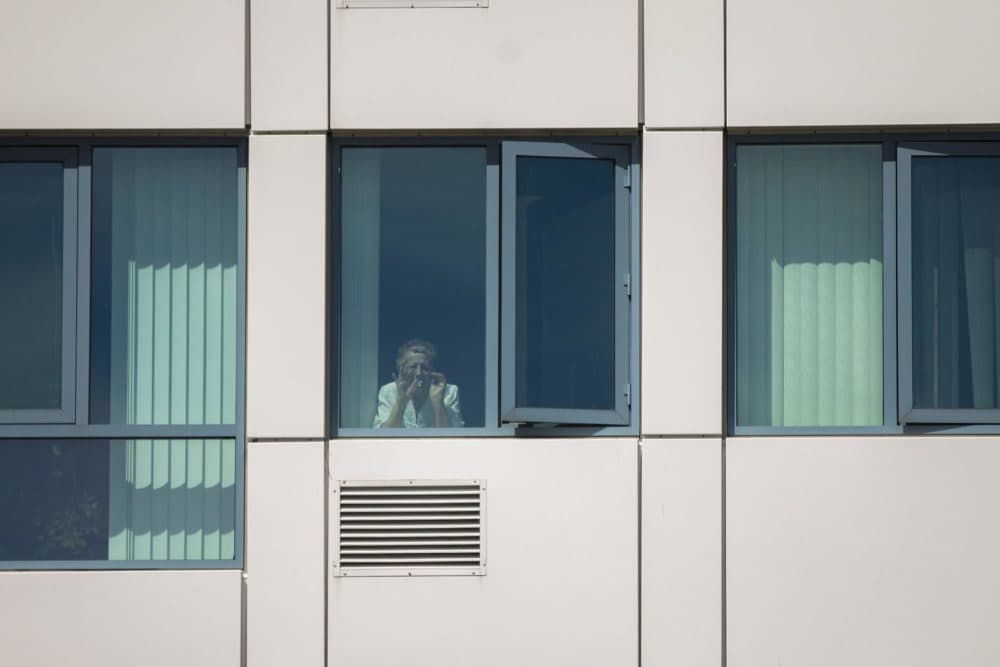Advertisement
With Some Restrictions, You Can Now Visit A Loved One In A Mass. Nursing Home

Ten weeks after asking nursing homes and other senior long-term care facilities to prohibit all outside visitors and non-essential health personnel, the Baker administration is easing the guidelines.
Beginning June 3, people can visit friends and family in long-term care facilities as long as they and the facility’s staff adhere to certain rules:
- All visits must be scheduled in advance and take place in designated outdoor areas. (End-of-life-care visits may take place indoors in private rooms.)
- An employee trained in patient safety and infection control measures must be present at all times during the visit.
- All visitors will have their temperature taken and be screened for COVID-19 symptoms. Anyone with a “fever equal to or greater than 100.0 F, cough, shortness of breath, sore throat, myalgia, chills or new onset of loss of taste or smell” will not be allowed to visit a resident.
- During a visit, all employees and residents must wear surgical face masks, and visitors must wear some sort of face covering and remain at least six feet away.
- No more than two visitors will be allowed to see a resident at once.
- Staff must be able to transport residents safely to and from the outdoor visitation space. “At a minimum, safe transport means that the resident cannot be transported through any space designated as COVID-19 care space or [any] space where residents suspected or confirmed to be infected with COVID-19 are present.”
- Residents who have the coronavirus, or who are suspected of having it, may not receive visitors; those who have recovered may.
- Any visitor who develops symptoms consistent with COVID-19 within two days of a visit must alert the facility.
The guidance issued Monday night also specifies that long-term care facilities may “limit the length of any visit, the days on which visits will be permitted, the hours during a day when visits will be permitted, and the number of times during a day or week a resident may be visited.”
Visits are also dependent on “permissible weather conditions, availability of outdoor space, and sufficient staffing at the facility to meet resident care needs, and the health and well-being of the resident.”
The guidance does not currently apply to state-run nursing homes like the Holyoke and Chelsea Soldiers’ Homes or other “24/7 congregate care facilities.” At least in the case of the Soldiers’ Homes, the Executive Office of Health and Human Services says it plans to allow scheduled outdoor visits as per the guidance later in the month, but first wants to test all residents and staff for the coronavirus again.
The new guidance comes days after the administration wrapped up its universal testing program and released the results of the first round of nursing home audits. According to the state, 350 of 360 nursing homes were able to test at least 90% of all residents and staff by the deadline, and two-thirds of facilities passed the audit. (The audits are ongoing and the results of the second round should be out soon.) Nursing homes that meet both goals are eligible for extra state funding.
Nursing homes and other senior long-term care facilities have been disproportionately impacted by the coronavirus. As of Monday night, 4,349 residents have died from the virus in Mass. while another 21,413 residents and staff have tested positive or are likely to have had the virus. (Beginning Monday, the Mass. Department of Public Health began reporting “probable and confirmed” fatalities and case numbers together.)
These deaths account for at least 63% of all coronavirus related fatalities in the state. Nationwide, the U.S. Centers for Medicare and Medicaid Services report that the virus has killed nearly 26,000 elderly residents of long-term care facilities; the real number is expected to be much higher because not all nursing homes reported data to the government.
This article was originally published on June 01, 2020.
